INTERVIEW WITH WILDLIFE PHOTOGRAPHER MIKHAIL KOROSTELEV
Abstract
An experienced photographer and traveler, Mikhail Korostelev shares in this interview what wildlife photography means to him, how photography has influenced his perception of the world of animals, and what role photography plays in the animal rights movement and the environmental movement.
Keywords: photography, animals, wildlife, ecotourism
Brief note about the interviewee:
Mikhail Korostelev is a photographer and traveler who has been “hunting” for unique wildlife shots for many years. He specializes in photographing wild animals and has a particular interest in underwater photography. Mikhail's works have repeatedly won international competitions and he often uses his photography to raise serious environmental issues.

Alexander Kopytin (A.K.): Our journal attaches great importance to art, in particular the art of photography, as a way of promoting environmental values. Could you tell us when and why did you start photographing wildlife? What changes have occurred during your time as a wildlife photographer?
Mikhail Korostelev (M.K.): All my life I have been very fond of animals and nature. I only became interested in wildlife photography, especially underwater photography, at the mature age of 31. I was influenced by the underwater works of Steve Bloom, Alexander Safonov and the non-underwater projects of Igor Petrovich Shpilenok and Dmitry Shpilenok.
Over the years, I have learned not to focus on the result, but to get more pleasure from the process. At the same time, the results have continued to improve. I have always been a perfectionist. I wanted to shoot like no one else had done before me and win the most prestigious wildlife photography competitions.
А.К.: What place does photography of wild animals and their relationship with humans occupy in your work?
M.K.: For me, the relationship between animals and humans is very important. I am very sensitive to animal issues of keeping animals in captivity, hunting, exploitation of animals in circuses, and the destruction of animal habitats.
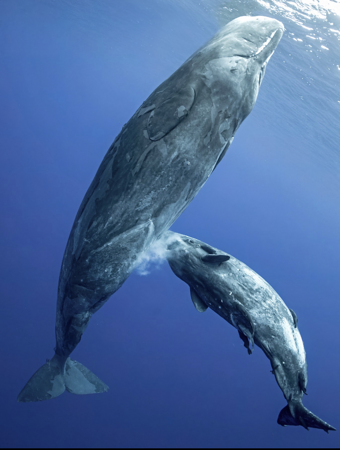
Photo 1: Sperm whales. Feeding a baby with milk. Indian Ocean.
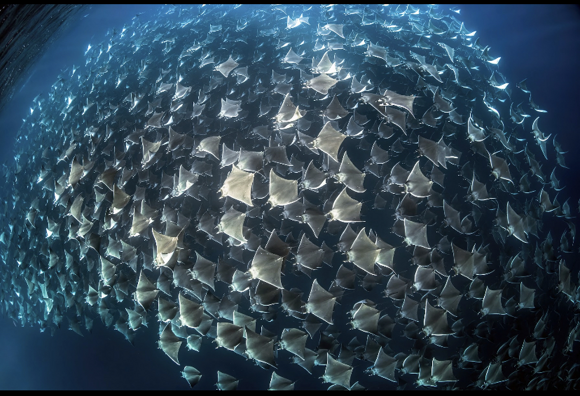
Photo 2: Mobula rocks. Pacific Ocean. Mexico.
A.K.: It seems to me that photographing animals has allowed you to see and realize their place in human life, in our destiny, in a new way. What new experience in the perception of the world of animals, knowledge of their nature and their relationship with humans could you get while doing photography?
M.K.: The main thing that I understood is that many animals do not deserve their bad reputations. It turns out that if you do not disturb them, observe them carefully and with respect, do not forget that you are their guest, then they do not show aggression, do not attack, and you are included in their environment. Thanks to this, I can shoot hippos, crocodiles, bears and sharks underwater.
А.К.: What species of animals, in particular those living in the water, may be of particular interest to you, and why?
M.K .: First of all, those that no one or almost no one has yet filmed. Bears, hippos, walruses. I'm interested in experimenting, finding a common language with them, and carefully blending into their environment.
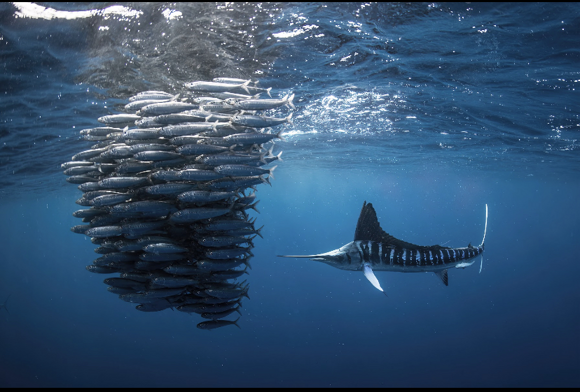
Photo 3: Marlin is hunting for sardines. Pacific Ocean. Mexico.
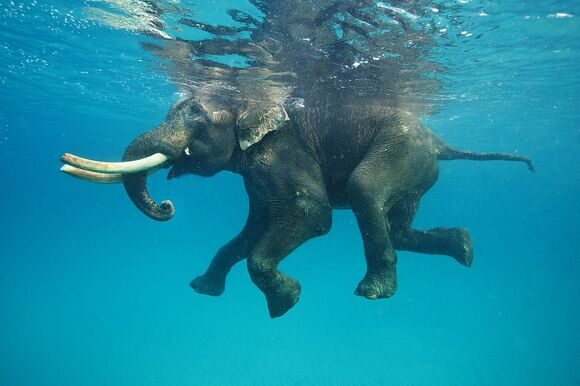
Photo 4: Indian elephant. Andaman Islands. India.
А.К.: How do you manage to find a common language with animals? Have you ever had the feeling that animals make contact with you, you have a kind of dialogue, and they understand you? Can you give any examples?
М.К.: I always look forward to making contact when I meet whales in the ocean. Sometimes animals do not want to communicate, often they just pass by. Sometimes they look fleetingly into your eyes. But there are also some longer interactions. Sometimes it's just a game, sometimes there are significant moments of contact. I was talking with a sperm whale for about 10 minutes, when suddenly he saw a plastic bag in the water. The whale picked up the bag with his jaw, brought it to me and left it, as if hinting that it was people who litter in the ocean and whales are suffering from this plastic garbage. I took the plastic bag away, to the joy of the sperm whale, and he waved his tail and swam away into the distance.
А.К.: Have you ever had a feeling of kinship or special closeness with wild animals, as if they can tell us something, and we can also tell them something significant in return?
M.K.: Of course. Animals can teach us a lot. For example, cetaceans have very strong family bonds. They are very emotional. They enjoy life and simple things and know how to find harmony with nature without destroying it. They do not parasitize, as we do, on our planet.
А.К.: Do we have something in common with animals, and if so, what? Can you explain this using the example of communication with specific types of animals?
M.K.: Both we and they have families, but with different structures. For example, killer whales have matriarchal families. Males do not participate in the upbringing of children, but all children always remain in the family, and older females (“grandmothers”) participate in upbringing. Sperm whales are about the same, but the males go on long journeys when they grow up. Dolphins have even more complex families with a range of different roles from scouts to kindergarten teachers.
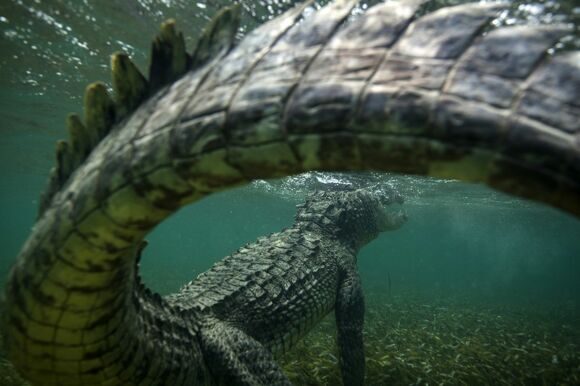
Photo 5: American combed crocodile. Mexico. Caribbean Sea.
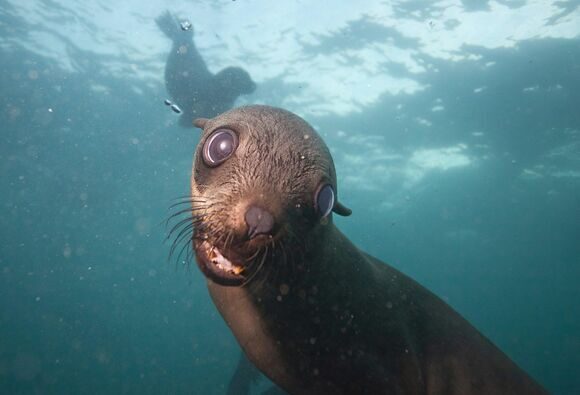
Photo 6: Cape fur seal. Cape Town. South Africa.
А.К.: You are not only a wildlife photographer, but also the founder of the Team Trip wildlife travel project and the whale watching and research project Whale Watching Russia. What motivated you to initiate these projects?
M.K.: Firstly, they provide the opportunity to travel, discover and explore new interesting places, and turn your life into one big journey. But an even more important factor is the people; the opportunity to meet new interesting people, open up the world of wildlife for them and understand that if it weren’t for me, many would never risk opening this door for themselves.
А.К.: In your opinion, what is the importance of ecotourism? What tasks, not only commercial, but also public, environmental, does it solve?
М.К.: Ecotourism is very important. It is a competitor to consumer tourism, when people trample down and alter places beyond recognition. Animals gradually leave such places, because they feel uncomfortable there. Ecotourism is a responsible tourism that takes into account the interests of not only people but also animals. Ecotourism enlightens and changes people's attitude to wildlife and their understanding of their place in nature.
A.K.: You admitted that you are very sensitive to issues such as keeping cetaceans in captivity, hunting, circuses with animals and the destruction of animal habitats. What are you doing to influence this practice; how are you involved in the animal rights movement or the environmental movement?
М.К.: I cannot say that I actively participate in these movements. My participation primarily consists in showing people our nature through my travels and photographs and teaching them how to take care of it.
But I, like many others, participated to the best of my ability in the fight for the release of killer whales and beluga whales from the whale prison in 2018-2019. A huge role was then played by the Sakhalin Ecowatch organization, which, unfortunately, was recently declared to be a foreign agent. Unfortunately, all environmental organizations, in particular WWF and Greenpeace, have now been destroyed in Russia. After all, they prevent business from destroying nature.
A.K.: Does this mean that there are no organizations left in our country that would carry out such important work to protect nature from business, protect animal rights? What social movements and forces are already playing or could play a role in this matter in the future?
M.K.: There are no organizations left, but the people who worked in them remain. And many of them will continue to protect nature.
А.К.: Thank you very much.
Interviewed by: Kopytin, Alexander
Doctor of Medical Sciences, Professor, Department of Psychology, St. Petersburg Academy of Postgraduate Pedagogical Education (St. Petersburg, Russia)
Reference for citations
Kopytin, A. (2023). Interview with wildlife photographer, Mikhail Korostelev. Ecopoiesis: Eco-Human Theory and Practice, Vol.4(2). - URL: http://en.ecopoiesis.ru

